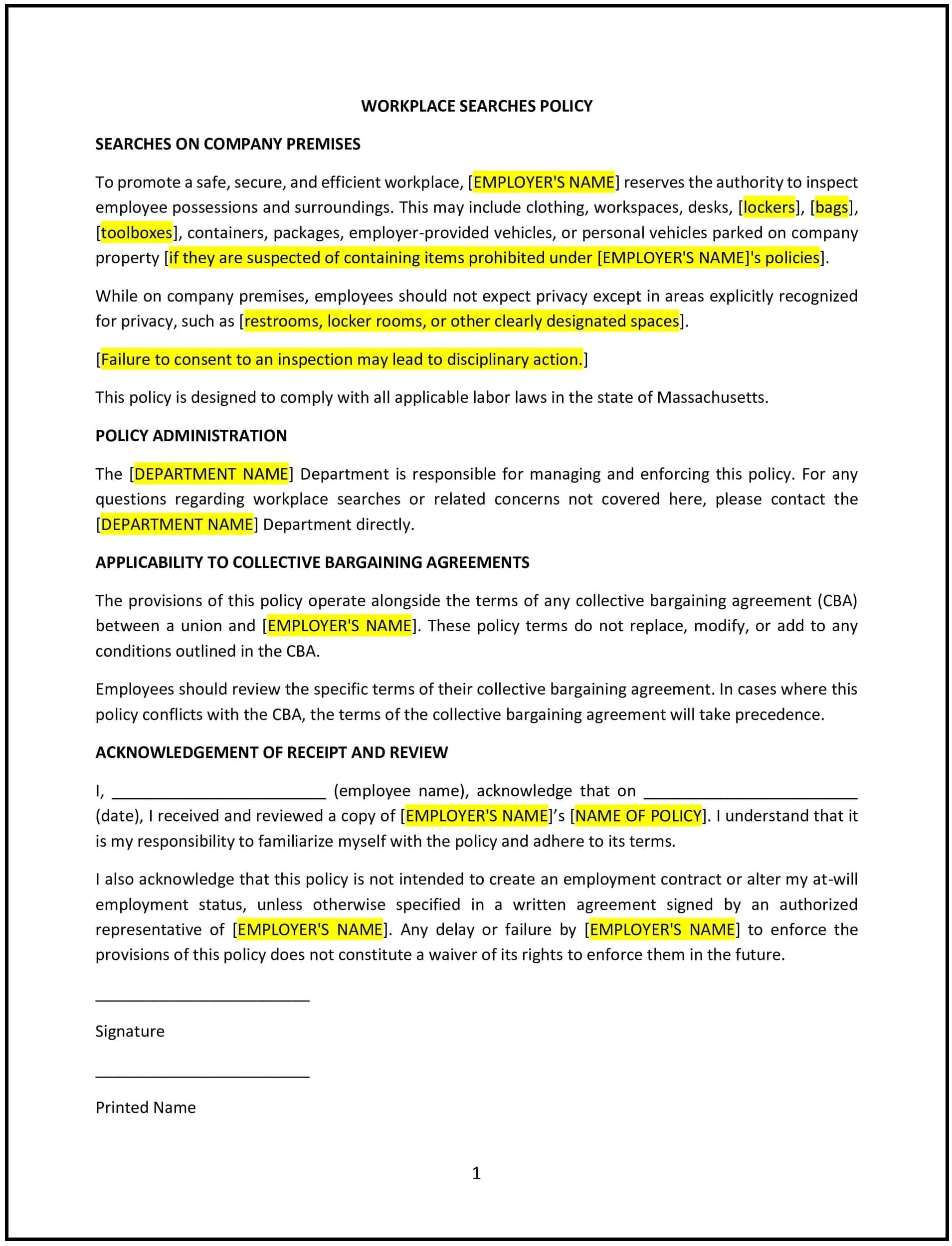Workplace searches policy (Massachusetts): Free template
Got contracts to review? While you're here for policies, let Cobrief make contract review effortless—start your free review now.

Customize this template for free
This workplace searches policy is designed to help Massachusetts businesses establish clear and fair procedures for conducting searches in the workplace. The policy outlines the company’s approach to workplace searches, including the circumstances under which searches may be conducted, the process for conducting them, and the rights of employees. It is intended to maintain a safe and secure work environment while respecting employee privacy and achieving compliance with Massachusetts state laws and federal regulations.
By adopting this policy, businesses can prevent theft, ensure the safety of employees, and protect company assets while maintaining transparency and fairness in workplace practices.
How to use this workplace searches policy (Massachusetts)
- Define the scope of searches: Clearly define what types of searches may be conducted in the workplace. This may include searches of employee bags, desks, lockers, vehicles, or personal belongings when on company premises. The policy should also specify the circumstances that warrant such searches, such as suspected theft, violation of company policy, or ensuring workplace safety.
- Specify the approval process: Outline the process for obtaining approval to conduct a search. This could include approval from HR, management, or another designated authority. The policy should ensure that searches are authorized and not conducted arbitrarily.
- Establish guidelines for conducting searches: Provide detailed guidelines on how searches will be conducted. This includes the need for searches to be conducted by a designated individual, ensuring the employee’s dignity is maintained, and that searches are carried out respectfully and professionally. The policy should clarify that searches will be done in a manner that minimizes discomfort and embarrassment.
- Address employee consent: Specify whether employees are required to give consent for workplace searches. While employees may be informed that their personal belongings may be searched under certain conditions, the policy should specify whether employees can refuse a search and the consequences of such a refusal.
- Outline consequences for non-compliance: The policy should specify the potential consequences for refusing to cooperate with a search, such as disciplinary action or termination. It should also outline the steps the company will take if evidence of wrongdoing is found during a search.
- Ensure compliance with Massachusetts and federal laws: Ensure the policy complies with Massachusetts state laws and federal regulations regarding employee privacy and workplace searches, including restrictions on searches of personal property and the balance between employee privacy rights and employer interests.
- Review and update regularly: Periodically review and update the policy to ensure it remains compliant with Massachusetts state laws, federal regulations, and any changes in the company’s operations or policies.
Benefits of using this workplace searches policy (Massachusetts)
This policy offers several benefits for Massachusetts businesses:
- Promotes a safe and secure work environment: By addressing the issue of workplace searches, businesses can prevent theft, ensure the safety of employees, and protect company assets.
- Reduces legal risks: A clear and fair policy helps businesses minimize the risk of legal action related to privacy violations or improper search practices.
- Enhances transparency and fairness: The policy sets clear guidelines for conducting searches, ensuring that all employees are treated fairly and that searches are conducted consistently across the organization.
- Increases employee trust: When employees know that there are clear procedures in place for workplace searches, they are more likely to feel that searches are conducted fairly and in accordance with company policy, which can increase trust and morale.
- Improves compliance: The policy helps businesses comply with Massachusetts state laws and federal regulations regarding workplace privacy, ensuring that searches are carried out legally and respectfully.
- Strengthens organizational reputation: A company that demonstrates fairness and respect for employees' rights in its policies enhances its reputation as an ethical and responsible employer.
Tips for using this workplace searches policy (Massachusetts)
- Communicate the policy clearly: Ensure that all employees are aware of the workplace searches policy and understand the conditions under which searches may be conducted. Include the policy in the employee handbook and review it during onboarding or team meetings.
- Train managers and HR personnel: Provide training to managers and HR staff on how to implement the policy fairly and consistently. This training should cover the procedures for conducting searches, obtaining consent, and handling situations where an employee refuses a search.
- Maintain professionalism during searches: When conducting a search, ensure that it is done respectfully and professionally. Employees should be treated with dignity throughout the process, and searches should be conducted discreetly and without unnecessary disruption to their work.
- Address employee concerns: If employees have concerns about the policy or how searches are conducted, provide a clear process for them to voice those concerns and address any issues. This helps build trust and ensures the policy is applied consistently and fairly.
- Ensure proper documentation: Maintain proper documentation of any workplace searches, including the reasons for the search, any evidence found, and the actions taken. This documentation will help ensure that searches are conducted in accordance with the policy and can be used as a reference if needed.
- Review and update regularly: Periodically review the policy to ensure it remains compliant with Massachusetts state laws, federal regulations, and any changes in the company’s operations or legal requirements. Regular updates will help maintain the effectiveness and relevance of the policy.